Redecorating your entire home, or even a whole room, can sometimes feel a little overwhelming. If you want to refresh your interiors with minimal disruption, consider planning smaller projects, such as updating interior woodwork.
Updating your skirting boards, door frames, and window sills can be a simple yet effective transformation.
These small details can make a big impact on your final scheme and completely change the feeling of a room, as well as being the perfect place to be more adventurous with colour.
Discover inspiration for painted interior woodwork.
How to refresh your interior woodwork with paint colours
Add colour highlights to interior wood details
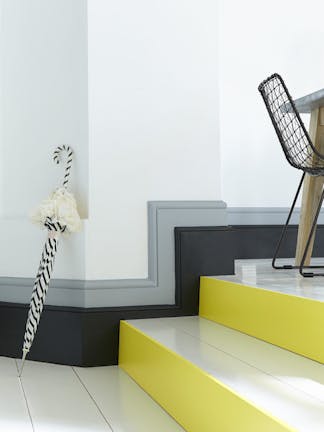
Painting your woodwork offers the perfect opportunity to add a pop of colour to a neutral colour scheme. Choose a contrasting colour combination that will create impact and add an element of design interest.
Trumpet is the brightest, most intense yellow in the Little Greene palette, making it an ideal accent shade. Pair clean Loft White walls with Urbane Grey and Lamp Black on the skirting. Introduce Trumpet on the stair risers for a surprising colour highlight.
Walls: Loft White
Skirting (from top to bottom): Urbane Grey & Lamp Black
Stair risers: Trumpet
Flooring: Shallows
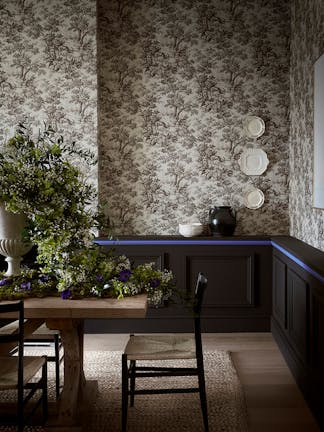
If you have a darker colour scheme, consider adding a contemporary twist with a vibrant accent shade. A signature bright blue such as Mambo will contrast beautifully with rich deep browns like Chocolate Colour. Colour highlights are ideally suited to sociable spaces like dining rooms, as they create a playful talking point for guests.
Wallpaper: Stag Toile – Chocolat
Panelling: Chocolate Colour
Coving & Ceiling: Rolling Fog
Trim: Mambo
Coordinate your woodwork with your existing wallpaper scheme
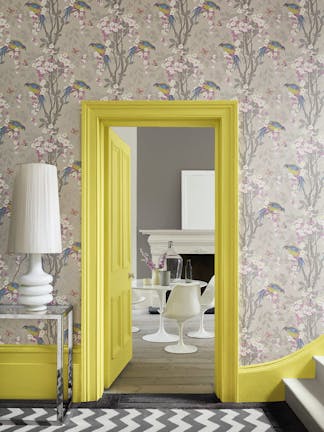
If your scheme includes wallpaper, select a bold, bright tone within the design to paint your door frames and skirting boards. This will create a joyful highlight and coordinate fabulously with the rest of your scheme.
Wallpaper: Loriini – Dorian
Woodwork: Trumpet
Chimney Breast: Grey Moss
Mantlepiece, Wall & Stairs: Cool Arbour
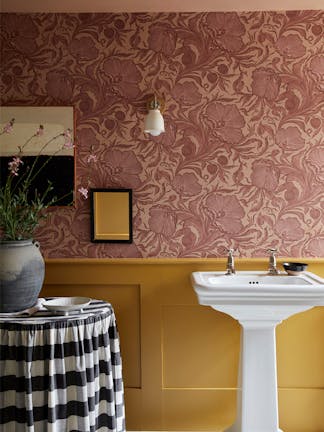
Guest bathrooms and bedrooms are places where you can afford to be slightly more daring with your colour choices. For more impact, choose a contrasting yet complementary shade to pair with wallpaper. Poppy Trail - Masquerade and Yellow-Pink is an elegant pairing that makes a real statement.
Wallpaper: Poppy Trail – Masquerade
Ceiling: Masquerade
Panelling: Yellow-Pink
Dado: Yellow-Pink
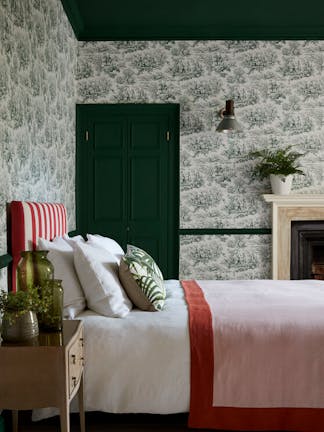
Bedrooms and snugs are wonderful places to utilise related dark shades on woodwork, to create a cosy and cocooning retreat. Pair Lovers’ Toile - Puck with the sumptuous green, Puck, on internal doors and dado rails. You can amplify this effect by taking the same shade onto the ceiling too, for a truly atmospheric bedroom space.
Wallpaper: Lovers Toile – Puck (c.1950)
Ceiling: Puck
Woodwork and Dado: Puck
Add contrast with dark tones on woodwork
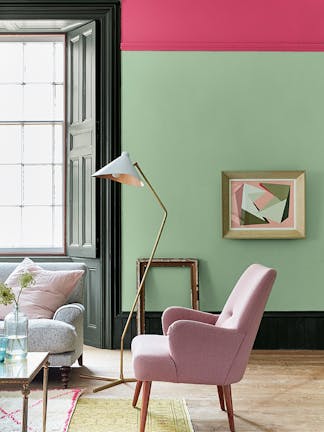
Painting woodwork is a great opportunity to incorporate darker tones that can sometimes be difficult to use all over. Choose a strong shade like black, dark green or deep brown to create a contemporary contrast.
The best paint colours for interior wood and trim will depend on the complementary shades in the overall scheme. If your living room is painted in a soft green such as Pea Green, consider a rich off-black green like Obsidian Green. This will create much more impact than standard whites or neutrals, giving your living space a real sense of character.
Cornicing: Slaked Lime
Highlight Stripe: Leather
Wall: Pea Green
Skirting and Panelling: Obsidian Green
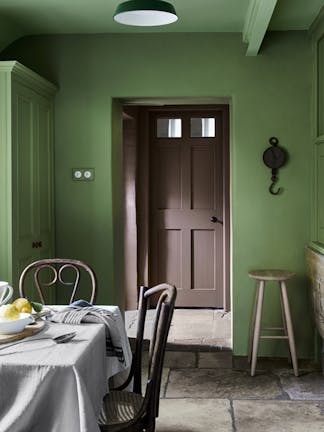
Deep browns like Scullery also work wonderfully with greens, as this is a natural colour pairing that we often see in the world around us. Use Scullery alongside the summery green, Garden, to instil your kitchen space with an earthy, rustic and homely ambience.
Ceiling: Pea Green
Walls: Garden
Larder Cupboards: Garden
Inside Cupboard: Dock Blue
Far Walls & Door: Scullery
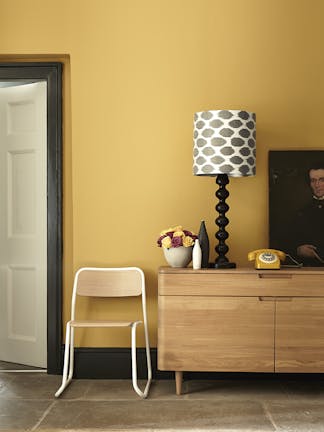
If you choose black for the woodwork, consider a soft off-black such as Lamp Black. This deep hue is a little easier on the eye than a true black and delivers a gentler living environment. Paint wood in this dark shade of black alongside brightly coloured walls in Yellow-Pink.
Wall: Yellow-Pink
Door frame and skirting: Lamp Black
Browse more ideas for incorporating black paint in your schemeBring balance to a colourful scheme with muted woodwork
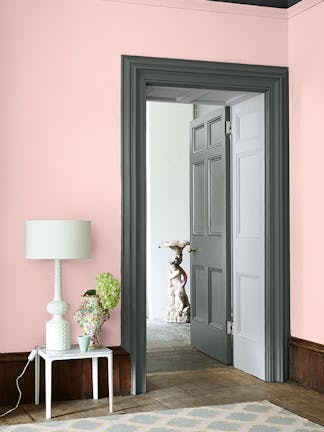
Incorporating a muted, earthy tone into a scheme can bring balance and clarity to other shades. Here, Livid has a grounding effect which juxtaposes the sweetness of Confetti.
Wall: Confetti
Door frame and Door: Livid
Inside Door Panelling: Gauze – Dark
Above Picture Rail: Lamp Black
Enhance the brightness of your space with painted window frames
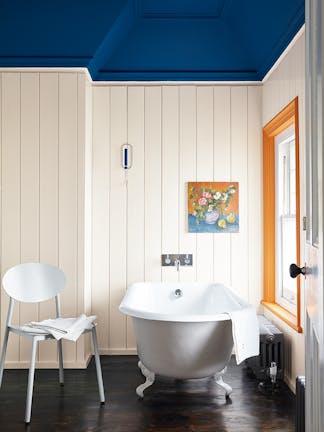
Window frames are the perfect wooden surface for experimenting with stronger colours. They are bathed in natural light and offer the chance to create a focal point. Here, Marigold draws in the light and adds brightness to the space.
Wall: Flint
Ceiling: Deep Space Blue
Window Frame: Marigold
Create a harmonious combination with complementary colours on woodwork
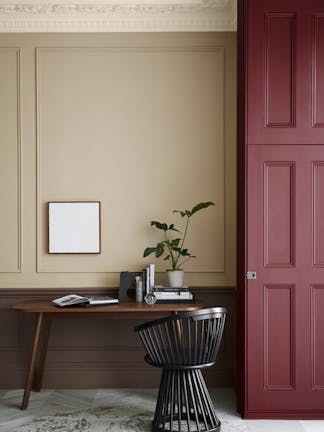
Select complementary shades for your interior woodwork to bring all elements of the scheme together. Utilise our Colour Scales families to choose interior wood paint colours that create a harmonious, tonal scheme.
Pair the soft neutral, Castell Pink, on walls with dark, rich shades like Arras and Nether Red on the surrounding panelling and woodwork for an inspiring study with plenty of design interest.
Ceiling & Cornicing: Ferdinand
Upper Wall: Castell Pink
Lower Wall: Arras
Skirting and Shutters: Nether Red
Read more of our tips for painting skirting boardsHow to Choose the Best Paint for Interior Wood?
Once you have selected a paint colour for your woodwork, you need to decide on a paint finish. For a quick-drying, easy-to-apply yet durable finish, choose one of our Intelligent paints in either Satin, Eggshell or Gloss:
Do I need a primer for interior woodwork?
With their Intelligent Grip™ technology, Intelligent Eggshell, Satin, Gloss are all self-priming finishes that can be applied direct from the tin onto almost all interior woodwork. If you are making a radical colour change such as black to white, you could first prime the surface using Intelligent ASP (All Surface Primer), which is tinted to a slightly lighter shade. Intelligent ASP has a speedy two-hour drying time, so projects can be completed quickly.
Before priming your woodwork, you should first sand the surface to provide a key. Apply wood filler to any gaps or imperfections, then apply brush strokes of ASP in the same direction as the wood’s natural grain.
For more interior inspiration, explore our image gallery.
If you would like help choosing your paint colours, discover our colour consultancy service.




